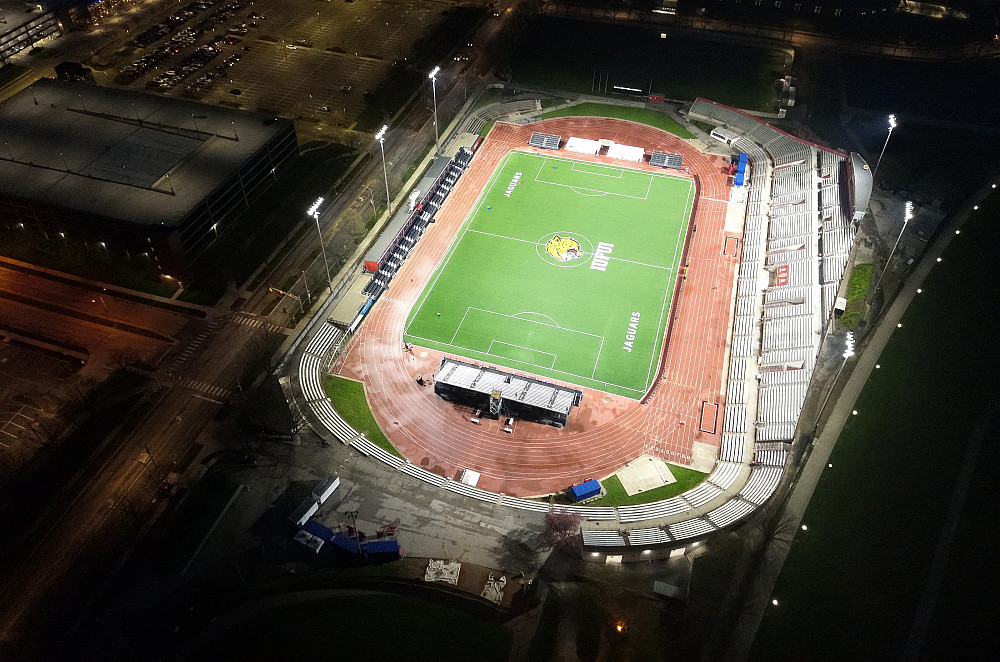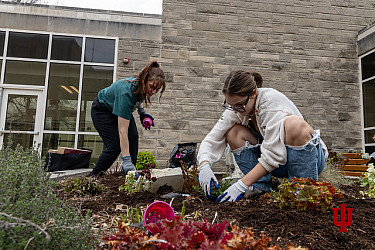From the Desk: Indiana University’s Climate Action Plan one year later
By Jessica Davis
November 05, 2024
In September 2023, Indiana University President Pamela Whitten approved the IU Climate Action Plan, which created a pathway for the university to reduce its greenhouse gas emissions to neutral by 2040.
One year later, the IU Office of Sustainability, in collaboration with countless partners across the university, has laid a strong foundation for IU to continue the pursuit of its climate action goals.
Implementation
To provide support and coordination of the Climate Action Plan, the IU Office of Sustainability has been centralized to serve all campuses. New directors were hired at IU Bloomington and IU Indianapolis, and we continue to hire new team members and interns to serve all campuses.
In January, Climate Action Plan Implementation Committee members were appointed by their campus leadership to develop recommendations to guide the implementation of the plan on their respective campuses. Additionally, the Climate Action Plan website was updated to include dashboards that track greenhouse gas emissions, utility data and implementation progress.
Infrastructure and renewables

In a forward-thinking pilot program, IU Indianapolis is testing dynamic air filters to reduce energy use from air handler units, a potential game-changer in energy efficiency. Efforts like this inform future repair and rehabilitation project recommendations with an emphasis on energy savings.
Existing solar assets at IU Bloomington and IU Indianapolis are being assessed to inform future infrastructure and operational models for renewables at IU. Additionally, solar planning has been incorporated into new building design, ensuring they can accommodate solar panels.
Fleet electrification
After a multi-month benchmarking study of peer universities’ electric vehicle strategies, IU is in the planning stages for its own EV transition. Every campus participated in Duke’s Fleet Electrification Advisory Program, which outlined strategies for replacement models and timelines of fleet vehicles based on their use and function. Climate Action Plan Implementation Committee members identified locations for future EV charger installations on each campus based on a variety of influencing factors such as electrical load, infrastructure and ADA accessibility.
IU Bloomington was accepted into the Clean Bus Planning Award program, backed by the Department of Transportation and the Department of Energy. This program provides IU with free technical planning to support the transition to no- and low-emission bus technologies. In addition to technical planning, IU will receive deployment assistance upon completion.
Operations and behavior
Several programs have been created to encourage the adoption of sustainable behaviors outlined in the Climate Action Plan. Over 200 spaces heaters were removed from IU campuses thanks to users voluntarily exchanging them for electric blankets, which use 90% less energy than space heaters. Sustainability internships are being expanded across all campuses, providing hands-on sustainability learning opportunities for students that directly contribute to the plan.

This fall, IU Sustainability launched the Campus Decarbonization Implementation Workshop Series, which teaches students, faculty and staff how to prioritize, develop and implement decarbonization strategies at IU. Several operational staff at IU are instructors in this series, sharing the depth of their technical knowledge and experience.
Financing
IU has been proactively seeking external funding to support the Climate Action Plan. Several federal and state grants totaling over $108 million have been submitted for projects such as solar and EV chargers, tree plantings, and heat recovery.
Looking forward
As IU continues its decarbonization journey, the university remains committed to building resilient, energy-efficient campuses that serve as models of sustainability. There will undoubtedly be challenges along the way, but experience has taught me there is nothing the IU community can’t solve.
A heartfelt thank you to the good people of IU who have dedicated countless hours to these efforts. While sustainability may not be in your job description, you have embraced it with enthusiasm, and for that I am grateful. Onward to 2040.
Jessica Davis is associate vice president and chief sustainability officer at Indiana University.